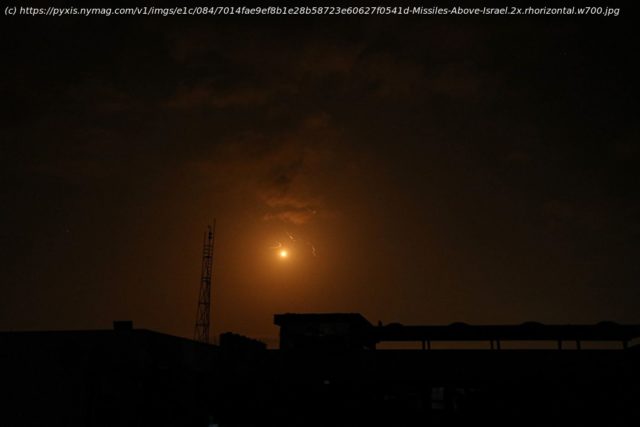Iran’s unprecedented air assault on Israel may escalate into a regional war. Here’s the latest reaction, commentary, and analysis.
Overnight Saturday, Iran conducted an unprecedented direct attack on Israel, launching hundreds of drones and cruise and ballistic missiles on Israeli targets. Israel says it and its allies, including the U.S., almost entirely intercepted the air assault, and that the strikes caused only minor damage to one Israeli military base. So far, there’s only been one reported injury, a ten-year-old child who was hospitalized in serious condition after being struck by shrapnel from one of the interceptions.
The attack was in retaliation for Israel’s April 1 airstrike on Iran’s consulate in Syria, which killed two Iranian generals and five other military officers. Iran’s government has signaled that it now views the matter “concluded,” but it’s not yet clear if or how Israel will respond, or how involved the U.S. might be in that response. (The White House has reiterated that U.S. support for Israel remains “ironclad.”) There’s no question that the dramatic escalation in violence between the two countries risks triggering a wider and potentially destabilizing regional war, far beyond the ramifications of what’s already happening in Gaza. Below is a running look at how various analysts, experts, and other commentators are responding to the news and what they’re saying about what might or should happen next.
There’s something to be said about the Islamic Republic of Iran firing missiles and drones that are passing above the third holiest site in Islam. (via Telegram) pic.twitter.com/nba62gzxW0— Holly Dagres (@hdagres) April 13, 2024
At TPM, Josh Marshall notes that Israel’s military is not really built to fight such a conflict:
The U.S. will of course be applying a huge amount of pressure on Israel to deescalate the situation. But there are other considerations for Israel. Deterrence is critical for Israel. So just on the level of basic IDF doctrine it’s very difficult for Israel not to respond to this. But there are other considerations that don’t get enough attention. The IDF is a military designed for short wars in which it moves rapidly to move the conflict off its territory. The country has no strategic depth (no territory to fall back on) and it has a mass reserve mobilization military. So moving immediately on to the offensive to win decisive battles off its own territory is critical.
But the IDF has already been fighting for seven months. It’s lost a lot of readiness through that. Part of the short war thing is that it relies on mass mobilization which it can’t do for that long. So Israel has its own very big risks letting this evolve into a broader regional conflict.






